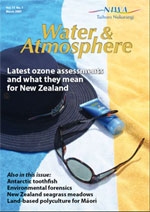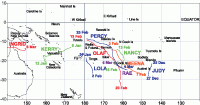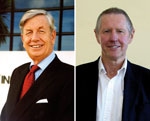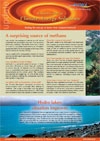PDF of this article (128 KB)

Climate scientists making a difference
It was an impressive line-up at a recent climate change seminar in Wellington – and not just because the speakers ‘walked the walk’ by travelling to the event by bike and train.
The seminar, hosted by Victoria University and the Royal Society, was an opportunity for an influential audience to hear the headline results of the latest report from Working Group 1 of the UN Intergovernmental Panel on Climate Change (IPCC). This is an authoritative summary of the science of climate change.

‘It’s taken four years to get to this point,’ said David Wratt. David leads NIWA’s National Climate Centre and is the only New Zealander on the bureau (or steering committee) of the IPCC. The previous report was in 2001. After a brief respite, the bureau began drawing up the scope of this new report and selecting 130 of the world’s top climate scientists to be ‘lead authors’. NIWA principal scientists Dave Lowe and Jim Renwick are among them.
The report concludes that there is unequivocal evidence of global warming and most of the warming since the mid–20th century is very likely to be the result of human activity.
‘Atmospheric carbon dioxide levels now far exceed their natural range over the last 650 000 years. The carbon isotopic footprint is exactly what you’d expect from increased burning of fossil fuels like coal and oil, with some contribution from burning forests,’ Dave Lowe told the seminar.
‘It’s a richer, more compelling story this time’, said Jim Renwick, pointing particularly to evidence that the oceans have warmed down to at least 3000 metres.
Even if we hold greenhouse gas concentrations at today’s level, the report says we would expect about another 0.6 degrees warming by 2100. The important thing, said David Wratt, is ‘what we do is going to make a difference. If we go for lower emissions, we get much less extra warming.’
For further information, contact: Dr David Wratt, 0-4-386 0588, [email protected]
New Year Honours


Two key players at NIWA have been named in the 2007 New Zealand Honours list: former CEO Paul Hargreaves and Dr Clive Howard-Williams.
Paul has become an Officer of the Order of Merit, in recognition of his services to business. He was involved with NIWA from its foundation, beginning with an appointment to the Establishment Board in 1991 followed by various postions on the NIWA Board of Directors, including Deputy Chair and Acting Chair. After a period as acting Chief Executive, Paul became CEO in 1995, working closely with Research Director Rick Pridmore and Operations Director Rod East to transform NIWA’s management structure. Together they created ‘One NIWA’, the project-based system that underpins NIWA’s success in environmental research and consultancy. Paul retired as NIWA Chief Executive in 2002.
Clive Howard-Williams, General Manager (Freshwater, Coasts & Education), has received the New Zealand Antarctic Medal for services to Antarctic science. The medal, which has been instituted to replace the (British) Polar Medal, recognises Clive’s outstanding contribution to scientific research; this is the first year the medal has been awarded and he is one of the first two recipients.
Clive’s experience in polar research, spanning more than 20 years, has focused on microbial ecosystems in inland waters, on glacial streams and lakes in the Dry Valleys, and on the McMurdo Ice Shelf. In recent years he has been involved in strategic science activity in national and international forums, including the International Polar Year, Antarctica New Zealand’s Latitudinal Gradient Programme, and the Scientific Committee on Antarctic Research (SCAR).
For further information, contact: Dr Geoff Baird, 0-4-386 0574, [email protected]
